#metaphysics true crime
Explore tagged Tumblr posts
Photo

Need more paranormal content? Add Mile Higher Podcast to your list.
With hosts Josh and Kendall, the podcast explores many topics including unexplained phenomena, metaphysics, futurism, ancient civilizations amongst true crime and conspiracies.
#mile higher podcast#kendall rae#josh thomas#paranormal content#true crime#conspiracy theories#conspiracies#unexplained phenomena#unexplained#futurism#ancient civilizations#metaphysics
3 notes
·
View notes
Text
After cleansing my crystals and self with sage for the first time I feel incredibly lighter and more positive! Now, time to relax with a caffeinated soda and a true crime show-
#I am a dumpster fire#healing crystals#saging#true crime documentary#watching tv#metaphysical#Ignore me#Farona yaps#Tw food mention#tw crime
1 note
·
View note
Note
Bro no one hates jews for ethnicity, news are hated for faith.
If you are an atheist "jew", no one gives a shit about you.
Stop pretending to be a victim and trying to appropriate antisemitic struggles.
I'll address these point by point.
Jewish readers, please share your thoughts!
You wrote: "No one hates Jews for ethnicity, [J]ews are hated for faith."
"Hitler...defined the Jews as a race and not a religious community, characterized the effect of a Jewish presence as a “race-tuberculosis of the peoples,” and identified the initial goal of a German government to be discriminatory legislation against Jews."
[Source]
More here
As David Baddiel put it, "I'm an atheist, but that would get me no free passes out of Auschwitz."
The Jews are a people. Judaism is the traditional religion of that people. A Jew who does not engage with that religion does not cease to be a Jew by Jewish definitions OR by antisemitic definitions.
You wrote: "If you are an atheist Jew, nobody gives a shit about you."
First, see above.
Second, you're incorrectly assuming that a Jewish atheist is not engaged with Judaism.
Here's the thing:
Judaism isn't necessarily theistic.
Let's set aside the explicitly non-theistic movement of Humanistic Judaism for a moment (huge topic for another time) and just talk briefly about theism in Judaism.
Most kinds of Judaism, while certainly encouraging faith, do not require it. There are no thought crimes in Judaism, no crucibles of faith, and no requirements that one announce or perform proof of belief for witnesses. Those things are often parts of Christianity and Islam, but in Judaism...not so much.
In Jewish thought, it is not what you believe about metaphysics which lifts you up, ennobles you, improves you, or makes the world a better place. In Judaism, you pursue those things by how you behave.
Sola fide is a Christian concept which Judaism does not share. Judaism is a profoundly existential religion with ethics which are overwhelmingly humanist.
I was raised in Reform and Conservative congregations...and non-theistic/atheistic/humanistic views were very common there.
When I was studying to become Bar Mitzvah, our congregation's Rabbi made crystal clear to me that there was no contradiction between my identity as a Jew and my inability to swallow the idea of an anthropomorphic, sapient, interventionist God who cared at all about petitionary prayer. He felt that wrestling with God was a very Jewish thing to do. He introduced me to Maimonides' apophatic theology. Decades later, I'm still grateful.
Many Jews pray, I believe, not to be heard by God, but so they can hear their own hearts and minds. This is why kavanah is important and why I disliked (and still dislike) prayer-by-rote and rituals performed for the sake of ritual. It's more mindfulness meditation than petitionary prayer.
There's a famous Hasidic story, recorded by philosopher Martin Buber in his "Tales of the Hasidim," about how Judaism views atheism:
The Master teaches that God created everything the world to be appreciated, since everything is here to teach us a lesson.
One clever student asks "What lesson can we learn from atheists? Why did God create them?"
The Master responds "God created atheists teach us the most important lesson of them all- the lesson of true compassion. You see, when an atheist performs an act of charity, visits someone who is sick, helps someone in need, and cares for the world, he is not doing so because of some religious teaching. He does not believe that God commanded him to perform this act. In fact, he does not believe in Goda at all, so his acts are based on an inner sense of morality. And look at the kindness he can bestow upon others simply because he feels it to be right."
"This means," the Master continued "that when someone reaches out to you for help, you should never say 'I pray that God will help you.' Instead for the moment, you should become an atheist, imagine that there is no God who can help, and say 'I will help you."
You wrote: "Stop pretending to be a victim and trying to appropriate antisemtic struggles."
I invite other Jews to advise if I have appropriated anything which is not mine.
Your opinion, though? Your view, as a non-Jew, about what is or isn't Jewish? On what is or is not mine in my heritage? Your claim, framed by your obvious and absolute ignorance of my life, my family's history, Jewish history, Jewish theology, and Jewish philosophy, that I have not experienced antisemitism and am "appropriating?"
I don't have a single fuck to give about any of that, and neither does any other Jew
Still, thank you for the writing prompt. It helps to crystalize my own thinking and provides an opportunity to educate.
#jumblr#hate mail#Racial antisemitism#antisemitism#Atheism#Humanistic Judaism#Maimonides#Apophatic theology#Jewblr#jewish tumblr
310 notes
·
View notes
Text
FTC vs surveillance pricing
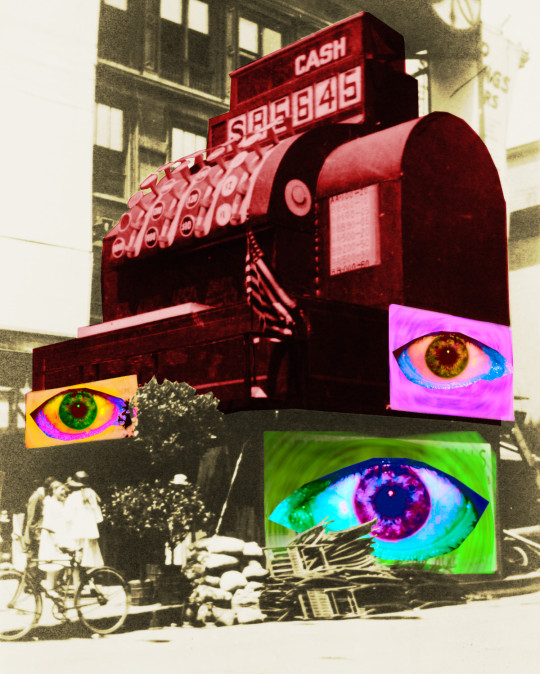
Support me this summer on the Clarion Write-A-Thon and help raise money for the Clarion Science Fiction and Fantasy Writers' Workshop!

In the mystical cosmology of economics, "prices" are of transcendental significance, the means by which the living market knows and adapts itself, giving rise to "efficient" production and consumption.
At its most basic level, the metaphysics of pricing goes like this: if there is less of something for sale than people want to buy, the seller will raise the price until enough buyers drop out and demand equals supply. If the disappointed would-be buyers are sufficiently vocal about their plight, other sellers will enter the market (bankrolled by investors who sense an opportunity), causing supplies to increase and prices to fall until the system is in "equilibrium" – producing things as cheaply as possible in precisely the right quantities to meet demand. In the parlance of neoclassical economists, prices aren't "set": they are discovered.
In antitrust law, there are many sins, but they often boil down to "price setting." That is, if a company has enough "market power" that they can dictate prices to their customers, they are committing a crime and should be punished. This is such a bedrock of neoclassical economics that it's a tautology "market power" exists where companies can "set prices"; and to "set prices," you need "market power."
Prices are the blood cells of the market, shuttling nutrients (in the form of "information") around the sprawling colony organism composed of all the buyers, sellers, producers, consumers, intermediaries and other actors. Together, the components of this colony organism all act on the information contained in the "price signals" to pursue their own self-interest. Each self-interested action puts more information into the system, triggering more action. Together, price signals and the actions they evince eventually "discover" the price, an abstraction that is yanked out of the immaterial plane of pure ideas and into our grubby, physical world, causing mines to re-open, shipping containers and pipelines to spark to life, factories to retool, trucks to fan out across the nation, retailers to place ads and hoist SALE banners over their premises, and consumers to race to those displays and open their wallets.
When prices are "distorted," all of this comes to naught. During the notorious "socialist calculation debate" of 1920s Austria, right-wing archdukes of religious market fundamentalism, like Von Hayek and Von Mises, trounced their leftist opponents, arguing that the market was the only computational system capable of calculating how much of each thing should be made, where it should be sent, and how much it should be sold for.
Attempts to "plan" the economy – say, by subsidizing industries or limiting prices – may be well-intentioned, but they broke the market's computations and produced haywire swings of both over- and underproduction. Later, the USSR's planned economy did encounter these swings. These were sometimes very grave (famines that killed millions) and sometimes silly (periods when the only goods available in regional shops were forks, say, creating local bubbles in folk art made from forks).
Unplanned markets do this too. Most notoriously, capitalism has produced a vast oversupply of carbon-intensive goods and processes, and a huge undersupply of low-carbon alternatives, bringing the human civilization to the brink of collapse. Not only have capitalism's price signals failed to address this existential crisis to humans, it has also sown the seeds of its own ruin – the market computer's not going to be getting any "price signals" from people as they drown in floods or roast to death on sidewalks that deliver second-degree burns to anyone who touches them:
https://www.fastcompany.com/91151209/extreme-heat-southwest-phoenix-surface-burns-scorching-pavement-sidewalks-pets
For market true believers, these failures are just evidence that regulation is distorting markets, and that the answer is more unregulated markets to infuse the computer with more price signals. When it comes to carbon, the problem is that producers are "producing negative externalities" (that is, polluting and sticking us with the bill). If we can just get them to "internalize" those costs, they will become "economically rational" and switch to low-carbon alternatives.
That's the theory behind the creation and sale of carbon credits. Rather than ordering companies to stop risking civilizational collapse and mass extinction, we can incentivize them to do so by creating markets that reward clean tech and punish dirty practices. The buying and selling of carbon credits is supposed to create price signals reflecting the existential risk to the human race and the only habitable planet known to our species, which the market will then "bring into equilibrium."
Unfortunately, reality has a distinct and unfair leftist bias. Carbon credits are a market for lemons. The carbon credits you buy to "offset" your car or flight are apt to come from a forest that has already burned down, or that had already been put in a perpetual trust as a wildlife preserve and could never be logged:
https://pluralistic.net/2022/03/18/greshams-carbon-law/#papal-indulgences
Carbon credits produce the most perverse outcomes imaginable. For example, much of Tesla's profitability has been derived from the sale of carbon credits to the manufacturers of the dirtiest, most polluting SUVs on Earth; without those Tesla credits, those SUVs would have been too expensive to sell, and would not have existed:
https://pluralistic.net/2021/11/24/no-puedo-pagar-no-pagara/#Rat
What's more, carbon credits aren't part of an "all of the above" strategy that incorporates direct action to prevent our species downfall. These market solutions are incompatible with muscular direct action, and if we do credits, we can't do other stuff that would actually work:
https://pluralistic.net/2023/10/31/carbon-upsets/#big-tradeoff
Even though price signals have repeatedly proven themselves to be an insufficient mechanism for producing "efficient" or even "survivable," they remain the uppermost spiritual value in the capitalist pantheon. Even through the last 40 years of unrelenting assaults on antitrust and competition law, the one form of corporate power that has remained both formally and practically prohibited is "pricing power."
That's why the DoJ was able to block tech companies and major movie studios from secretly colluding to suppress their employees' wages, and why those employees were able to get huge sums out of their employers:
https://en.wikipedia.org/wiki/High-Tech_Employee_Antitrust_Litigation
It's also why the Big Six (now Big Five) publishers and Apple got into so much trouble for colluding to set a floor on the price of ebooks:
https://en.wikipedia.org/wiki/United_States_v._Apple_(2012)
When it comes to monopoly, even the most Bork-pilled, Manne-poisoned federal judges and agencies have taken a hard line on price-fixing, because "distortions" of prices make the market computer crash.
But despite this horror of price distortions, America's monopolists have found so many ways to manipulate prices. Last month, The American Prospect devoted an entire issue to the many ways that monopolies and cartels have rigged the prices we pay, pushing them higher and higher, even as our wages stagnated and credit became more expensive:
https://prospect.org/pricing
For example, there's the plague of junk fees (AKA "drip pricing," or, if you're competing to be first up against the wall come the revolution, "ancillary revenue"), everything from baggage fees from airlines to resort fees at hotels to the fee your landlord charges if you pay your rent by check, or by card, or in cash:
https://pluralistic.net/2024/06/07/drip-drip-drip/#drip-off
There's the fake transparency gambit, so beloved of America's hospitals:
https://pluralistic.net/2024/06/13/a-punch-in-the-guts/#hayek-pilled
The "greedflation" that saw grocery prices skyrocketing, which billionaire grocery plutes blamed on covid stimulus checks, even as they boasted to their shareholders about their pricing power:
https://prospect.org/economy/2024-06-12-war-in-the-aisles/
There's the the tens of billions the banks rake in with usurious interest rates, far in excess of the hikes to the central banks' prime rates (which are, in turn, justified in light of the supposed excesses of covid relief checks):
https://prospect.org/economy/2024-06-11-what-we-owe/
There are the scams that companies like Amazon pull with their user interfaces, tricking you into signing up for subscriptions or upsells, which they grandiosely term "dark patterns," but which are really just open fraud:
https://prospect.org/economy/2024-06-10-one-click-economy/
There are "surge fees," which are supposed to tempt more producers (e.g. Uber drivers) into the market when demand is high, but which are really just an excuse to gouge you – like when Wendy's threatens to surge-price its hamburgers:
https://prospect.org/economy/2024-06-07-urge-to-surge/
And then there's surveillance pricing, the most insidious and profitable way to jack up prices. At its core, surveillance pricing uses nonconsensually harvested private information to inform an algorithm that reprices the things you buy – from lattes to rent – in real-time:
https://pluralistic.net/2024/06/05/your-price-named/#privacy-first-again
Companies like Plexure – partially owned by McDonald's – boasts that it can use surveillance data to figure out what your payday is and then hike the price of the breakfast sandwich or after-work soda you buy every day.
Like every bad pricing practice, surveillance pricing has its origins in the aviation industry, which invested early on and heavily in spying on fliers to figure out how much they could each afford for their plane tickets and jacking up prices accordingly. Architects of these systems then went on to found companies like Realpage, a data-brokerage that helps landlords illegally collude to rig rent prices.
Algorithmic middlemen like Realpage and ATPCO – which coordinates price-fixing among the airlines – are what Dan Davies calls "accountability sinks." A cartel sends all its data to a separate third party, which then compares those prices and tells everyone how much to jack them up in order to screw us all:
https://profilebooks.com/work/the-unaccountability-machine/
These price-fixing middlemen are everywhere, and they predate the boom in commercial surveillance. For example, Agri-Stats has been helping meatpackers rig the price of meat for 40 years:
https://pluralistic.net/2023/10/04/dont-let-your-meat-loaf/#meaty-beaty-big-and-bouncy
But when you add commercial surveillance to algorithmic pricing, you get a hybrid more terrifying than any cocaine-sharks (or, indeed, meth-gators):
https://www.nbcnews.com/news/us-news/tennessee-police-warn-locals-not-flush-drugs-fear-meth-gators-n1030291
Apologists for these meth-gators insist that surveillance pricing's true purpose is to let companies offer discounts. A streaming service can't afford to offer $0.99 subscriptions to the poor because then all the rich people would stop paying $19.99. But with surveillance pricing, every customer gets a different price, titrated to their capacity to pay, and everyone wins.
But that's not how it cashes out in the real world. In the real world, rich people who get ripped off have the wherewithal to shop around, complain effectively to a state AG, or punish companies by taking their business elsewhere. Meanwhile, poor people aren't just cash-poor, they're also time-poor and political influence-poor.
When the dollar store duopoly forces all the mom-and-pop grocers in your town out of business with predatory pricing, and creating food deserts that only they serve, no one cares, because state AGs and politicians don't care about people who shop at dollar stores. Then, the dollar stores can collude with manufacturers to get shrunken "cheater sized" products that sell for a dollar, but cost double or triple the grocery store price by weight or quantity:
https://pluralistic.net/2023/03/27/walmarts-jackals/#cheater-sizes
Yes, fliers who seem to be flying on business (last-minute purchasers who don't have a Saturday stay) get charged more than people whose purchase makes them seem to be someone flying away for a vacation. But that's only because aviation prices haven't yet fully transitioned to surveillance pricing. If an airline can correctly calculate that you are taking a trip because you're a grad student who must attend a conference in order to secure a job, and if they know precisely how much room you have left on your credit card, they can charge you everything you can afford, to the cent.
Your ability to resist pricing power isn't merely a function of a company's market power – it's also a function of your political power. Poor people may have less to steal, but no one cares when they get robbed:
https://pluralistic.net/2024/07/19/martha-wright-reed/#capitalists-hate-capitalism
So surveillance pricing, supercharged by algorithms, represent a serious threat to "prices," which is the one thing that the econo-religious fundamentalists of the capitalist class value above all else. That makes surveillance pricing low-hanging fruit for regulatory enforcement: a bipartisan crime that has few champions on either side of the aisle.
Cannily, the FTC has just declared war on surveillance pricing, ordering eight key players in the industry (including capitalism's arch-villains, McKinsey and Jpmorgan Chase) to turn over data that can be used to prosecute them for price-fixing within 45 days:
https://www.ftc.gov/news-events/news/press-releases/2024/07/ftc-issues-orders-eight-companies-seeking-information-surveillance-pricing
As American Prospect editor-in-chief David Dayen notes in his article on the order, the FTC is doing what he and his journalistic partners couldn't: forcing these companies to cough up internal data:
https://prospect.org/economy/2024-07-24-ftc-opens-surveillance-pricing-inquiry/
This is important, and not just because of the wriggly critters the FTC will reveal as they use their powers to turn over this rock. Administrative agencies can't just do whatever they want. Long before the agencies were neutered by the Supreme Court, they had strict rules requiring them to gather evidence, solicit comment and counter-comment, and so on, before enacting any rules:
https://pluralistic.net/2022/10/18/administrative-competence/#i-know-stuff
Doubtless, the Supreme Court's Loper decision (which overturned "Chevron deference" and cut off the agencies' power to take actions that they don't have detailed, specific authorization to take) will embolden the surveillance pricing industry to take the FTC to court on this. It's hard to say whether the courts will find in the FTC's favor. Section 6(b) of the FTC Act clearly lets the FTC compel these disclosures as part of an enforcement action, but they can't start an enforcement action until they have evidence, and through the whole history of the FTC, these kinds of orders have been a common prelude to enforcement.
One thing this has going for it is that it is bipartisan: all five FTC commissioners, including both Republicans (including the Republican who votes against everything) voted in favor of it. Price gouging is the kind of easy-to-grasp corporate crime that everyone hates, irrespective of political tendency.
In the Prospect piece on Ticketmaster's pricing scam, Dayen and Groundwork's Lindsay Owens called this the "Age of Recoupment":
https://pluralistic.net/2024/06/03/aoi-aoi-oh/#concentrated-gains-vast-diffused-losses
For 40 years, neoclassical economics' focus on "consumer welfare" meant that companies could cheat and squeeze their workers and suppliers as hard as they wanted, so long as prices didn't go up. But after 40 years, there's nothing more to squeeze out of workers or suppliers, so it's time for the cartels to recoup by turning on us, their customers.
They believe – perhaps correctly – that they have amassed so much market power through mergers and lobbying that they can cross the single bright line in neoliberal economics' theory of antitrust: price-gouging. No matter how sincere the economics profession's worship of prices might be, it still might not trump companies that are too big to fail and thus too big to jail.
The FTC just took an important step in defense of all of our economic wellbeing, and it's a step that even the most right-wing economist should applaud. They're calling the question: "Do you really think that price-distortion is a cardinal sin? If so, you must back our play." Support me this summer on the Clarion Write-A-Thon and help raise money for the Clarion Science Fiction and Fantasy Writers' Workshop!
https://clarionwriteathon.com/members/profile.php?writerid=293388

If you'd like an essay-formatted version of this post to read or share, here's a link to it on pluralistic.net, my surveillance-free, ad-free, tracker-free blog:
https://pluralistic.net/2024/07/24/gouging-the-all-seeing-eye/#i-spy
#pluralistic#gouging#ftc#surveillance pricing#dynamic pricing#efficient market hypothesis brain worms#administrative procedures act#chevron deference#lina khan#price gouging
161 notes
·
View notes
Text
In which I puzzle over metaphysical implications as regards the peoples inhabiting Arda
fyi, a certain familiarity with the (predominantly Christian, I think) concept of fallenness/unfallenness is assumed, although it turns out that it doesn't necessarily work here. Feel free to ask for clarifications
So. I'm once again wracking my head as I try to make sense of what I shall call: 'metaphysical states' of elves, men and others, because the subject is emphasised and lampshaded a lot in the books, and I can't force it all to make sense when taken together.
Ainur are a specific case and I should really leave them aside for now. They certainly can fall — and, unlike angels, change their mind, apparently (which goes both ways) — although they do seem to be more all-or-nothing than everyone else. Still, I think as long as one doesn't go into the implications of time and what its existence or nonexistence changes, they're almost straightforward. But then you have:
Elves. The 'Fall of the Noldor' is very strongly emphasised as a metaphysical fall from grace and further evils, even ones unconnected with the matter of the Silmarils themselves, are blamed on it later (Maeglin!) So far so good. Except. Non-Noldor are also liable to behave in ways that are not exemplary in the slightest, and it doesn't seem to signify a cesura in the same way — and the Noldor in Valinor were able to commit acts that perhaps weren't as heinous as what we call crimes, but weren't good either. Getting into rancid fights with your brother isn't much in comparison, but these are not the actions of unfallen people.
And on the other hand, authorial quote (paraphrased): "Elves in some ways represent Man in an unfallen state". And I'm inclined to agree: they aren't subject to death (except they may be killed, so doesn't this already break down?), and there is something very poignant in the image of their artistry, "extempt from earthly limitations". But they do not lose it, not in any easily tangible way. We can argue that evil diminishes creativity and it's probably true, but there is no hard line anyone passes. And this is again lampshaded in-world with the Númenoreans ("If we die because of some darkness that lay on us before, than why don't the Noldor?").
Which brings us to Men. The existence of a direct cause-effect relationship between fallenness and mortality in Arda cannot be ascertained (Even taking into account a Catholic framework, I feel that logically it need not be the same relationship as the Biblical one since, in contrast with the Garden of Eden, the world was already marred when humans appeared). While I consider the Tale of Adanel to be Gondorian in origin, I can also see the possibility that whatever Men did back then, beyond memory (or in other words "we purposefully forgot") was just that much worse than Alqualondë and the Oath. In any case, Man is very straightforwardly Fallen.
Hobbits. The rules for Halflings are presumably the same as for Men, which is certainly notable, given that they seem to be the least inclined to evil of all incarnates. Not perfect, not by a long shot, but unknowing of wars and violence. A pastoral image, only in-world it's true.
And at the same time, my musings bring me to the unexpected conclusion that dwarves are the only notable "generally unfallen" kindred. Which is, in context of everything that regards them, weird — because by their actions, they are very similar to Men. And yet — either the circumstances of their creation make them disadvantaged from the start (which doesn't really make that much sense), or something happened off-screen, or it's the same case as Saeros, or Thingol sending Beren to his death.
Ents? I honestly don't know if we've seen enough of ents to judge, although they seem generally good-inclined? Huorns are a different kettle of fish.
Before I try to explain orcs, it would do well to know what they are exactly.
In other words, I cannot make sense of it all, enough that I've resorted to calling the default state of incarnates in Arda "semi-fallen" (or, as is, "semi-unfallen"). Which is not a thing that makes sense, philosophically speaking — but I can find no better way.
(Although, to be quite honest, the default state of being in Arda (because of the discord?) seems to be significantly different from the unfallen state of Man as described by religious thinkers in some ways, and not all of them regard merely such things as physical marring, so perhaps "semi" isn't the worst way to describe it.)
In any case, if someone has thoughts on the subject, I'm very open to hearing them.
#post-midnight musings (on a weekday!) so I'm sorry if this makes no sense#my post#Silmarillion#silm#peoples of arda#religion
54 notes
·
View notes
Text
Transgender Visibility Day Two: Estrogenic Boobaloo
Alternatively,
Transgender Visibility Day Two: Testosteronic Dickaloo
It is now Transgender Visibility Day for the other half of the world!
Let us celebrate, but firstly before anything else. The council would like to give out a few statements.
While this is an amazing celebration of our resilience and continued resistance to transphobia, we mustn't forget
Our fallen, the many killed in hate unjustly. Nex Benedict being one of the most recent
Our fellow queer in Palestine, Sudan, the Congo, etc. We mustn't forget about their suffering whilst we celebrate here so freely. Though we should care about all of the people not just the queer and trans in those places being subjected to the most inhumane conditions by tyrants.
The many bills, laws, and legislation trying to be passed to further erase us. Especially the KOSA bill, and quite sadly in Florida recently having passed legislation to ban minors from social media as an attack on us to be put in to effect in 2025.
With all of those being said, we should all continue to fight for those causes, continue fighting censorship. Continue fighting genocide. Continue fighting slavery.
We ask you all to continue spreading the word of these causes, these evils that must be stopped. As the council is bound by metaphysical law, we may not exit this and help you in the way we wish.
Fight KOSA, and censorship
Fight for our fallen, whether it's the unjustly banned, those dead from self harm, or those murdered in cold blood
Fight for those still persisting, the ones showing a fervour of resistance to fight oppresors.
We draw our strength from solidarity, it is what has allowed us to continue. Let it be the reason we win this war.
Anyways, here is our second message to all Transgender beings out there:
You are valid, you know you best. And we mean it. We may be filled with wise wizards, but we know that only oneself knows itself best. You know your identity better than anyone. Even when it can feel like your body disagrees with your true self, or others don't see you for who you are.
Know that even with all the pain, the grief, the hate, we and many many others fight every second for you to be you. For you to be safe. For all of us to be ourselves.
And we will see that day come, and by that day we hope for all of us to have survived, to tell stories of our battles, to guide a new generation of queers.
We just ask you continue being you, and being safe, and you will see that day come we guarantee. Even if it doesn't seem like it.
This world is a dark room covered in oil, we are a small candle of hope. And when it seems too dark, our hope will light the room with a burning fervour. To free us from this room. To burn down our prison.
We love you and appreciate you for who you are, please continue as you're the only one of you.
"in the dark we endure, and in the light we fight for who you call impure"
happy transgender visibility day
- The Queer Wizard Council <3 <2
@skyethebisexualwolfwizard
@im-a-wizard-who-dont-crime
@thebutterflyoficeandwisteria
@bisexualchemistry
@sassy-piece-of-parsley
@flirtyambiguouswizard
@ballisticallytestedwensleydale
@the-moth-wizard-of-mayhem
@aroace-wizard
@serious-tabaxi
@agentldiddy
@parkyrtheelvishbard
@autistic-dinos-and-dragons-lover
@a-goose-in-a-trenchcoat
@sapphicdragons-3
@transgender-wizard
@jhomikle
@cynical-artificer
@anne-androgynous-android
@asheslab
@luminethefoxincabin13-ts
@incrediwizard
@amethyst-aster
@ash-the-tiefling
@shittest-wizard-ever
@bi-gender-sorcerer
@somecallmekay
@be-gentle-with-littluns
@ladyofspoons
@slymewitch
@alchemical-overreaction
@frogpantsthebloodgod
@yourlocalbreadenthusiast
@mango-lord-of-poison
@detectivewizzard
@the-necrobotanist
@lixorloveslicorice
@hyper-lynx
@chaos-wizard-nyehehe
@song-de-lune
@lord-devere
@waluigis-elbow
@so-um-brasileiro
#wizardposting#wizardblr#wizard council#queer wizard council#qwc#trans#transgender#trans rights#transgender rights#trans day#transgender day#transgender visibility day#transmasc#transfem#lgbt#lgbtq#lgbtqia rights#lgbtq community#lgbtq rights#lgbt pride#gazaunderattack#all eyes on rafah#eyes on rafah#palestine genocide#gaza genocide#free gaza#from the river to the sea#queer#lgbtqia
105 notes
·
View notes
Text
Suffering is not What You Think

(The Penitent Magdalene)
So often you hear, when people leave their churches, their gripes surround suffering. Why would God allow suffering? Why would God allow babies to be murdered and die of cancer? Why would He allow war and cannibalism and pedophilia? Why did God allow me to see my mother die? Why did he allow this or that?
What I cannot help but notice is that the people saying this are never talking about their own suffering.
"Why does God allow war?" said a cowardly young man who has never seen bloodshed. "Why does God allow cancer?" said a woman who is perfectly healthy. "Why does God allow abuse?" said a man who had the privilege of watching the sex abuse crisis of the RCC play out on the TV screen and not in the sacristy. "Why did God allow my mother do die?" said a daughter who is still alive.
We may mourn, and we ought to mourn, the sorrows and the fallenness of this world, but witnessing suffering is not the same as suffering.

(Just Take Them and Leave Me Alone)
This was never more clear to me than when I spent a summer arguing with my anti-natalist, atheist sister. She would spend hours berating my poor mother and father for the heinous crime of having children. During one of these spats, my sister turned to me and said, "How can you support natalism?" which she said like a slur, "your grandmother abused you from the moment you were born."
Now, this is true. Truer than she knew, or, if I have it my way, will ever know. My grandmother (who was my and my sister's primary caregiver) always despised me because I was born with a deformity. Her hatred only intensified when my sister was born. My sister was, in her eyes, perfect. As a child, my sister would ask for me to be abused in front of her, for her amusement, by my grandmother.
My sister witnessed plenty of my suffering, but she experienced not an iota of it. And yet, she used my suffering as a way to say that all of human life is suffering. She used it to discredit the worth of all human life.

(Ophelia)
I find this is always the case. When I was an atheist, I was confused by people who brought up the "problem of suffering". I never viewed my suffering as something that made my life worse. Even as an atheist and a child, I saw clearly how the suffering I experienced and was experiencing was driving me toward a larger purpose. This pattern of thought followed me into the sexual abuse I experienced in middle school and into my conversion.
My atheist associates, whose suffering I know well, likewise never cite their suffering as a reason for their disbelief. When you really get down to it, "God is a big meanie" is not a reason to reject His existence, say these associates of mine.
It is only being a witness to suffering-- usually an impotent witness-- that causes this specific kind of apostasy. Even if my sister had stopped encouraging it, I still would have been abused. Her behavior would have made little difference. It is the same for the sufferings I listed earlier. Regardless of what we tell ourselves, no boycotting, no Instagram post, and not even tax evasion or immolation will stop the Genocide Israel is purporting against the Palestinians. We, far removed, poor, and powerless foreigners, are impotent. We can do nothing to help someone with a terminal illness not die-- it's terminal. We can do nothing to help the kidnapped children we see on the news, taken from their homes halfway across the country. We cannot bilocate, live forever, or have infinite money.
When these people say, "Why does God allow suffering?" they are actually asking, "Why does God allow my impotence?" The implication is that, of course, they would solve these sufferings if only they were not impotent. Is this the case? I don't know; who am I to judge the heart of another man?
Whatever the case, it is clear to me that witnessing suffering is of some different metaphysical nature than the actual experience of suffering. I've written a little about this privately, so I will get around to expanding upon it in further posts.
#christian#christian blog#christian girl#orthodox christianity#greek orthodox#jesus#orthodox#orthodox christian#orthodox church#orthodoxy#russian orthodox#Antiochian#Christianity#bible#catholic#faith#salvation#atheism#atheist#antinatalism#the problem of evil#the problem of suffering#theology#theological#religious studies#religious trama#religion#catholicism#catholic church#christians
58 notes
·
View notes
Note
Dragonball has a couple interesting redemptions to talk about. Like Piccolo Jr., where depending on how you interpret his character changes both whether he has any significant crimes to be redeemed of, and the exact moment where this redemption begins. If you hold the Jr. is a seperate individual from Piccolo Daimao, then the only crimes he ever really committed are Attempted Murder (Of Goku) and mass property damage. And if you hold that Piccolo Jr. Was born a demon and lost that demonic status through positive character development, then his redemption technically occurs before he spends any time with Gohan, because he can't have been a demon when he killed Goku and Raditz (As Dragonball establishes that those killed by demons don't go to the afterlife). That scenario really makes you remember that Piccolo Jr. was only 3 years old when he fought Goku. And that's just one possible reading of his character
Piccolo is a complicated entity. There are basically three, arguably four versions of the character - but they are ultimately different facets of the same guy.
There's the original Piccolo-Daimao/Great Demon King Piccolo, of course. What's interesting about Daimao is that he seemingly lacks moral agency.
Piccolo isn't a demon because of how evil he is. He's a demon because, metaphysically, he is a demon. This is not a turn of phrase. It is not a title. It is not a fanciful status you can attain by kicking enough puppies. It is a mythological being.
When the Nameless Namekian ascended to become God, he purged all corruption and wickedness from his heart, and that wickedness became the demon Piccolo. As a demon, Piccolo is literally evil incarnate. He can only know evil. He can only be evil. He is incapable of anything else.

This man has no true goals, desires, or ambitions. He's just evil. Because he is composed entirely of evil and can know nothing but evil. By circumstances of his existences, he's not even really a person; He is just evil.
Even his idea of world domination is just genocide in slow motion.

He wants to kill everything for maximum evilness. He has a 43-year plan for disseminating fear, anarchy, and violence around society before he finishes killing all life on this planet. This is not a three-dimensional human being. This is what you get when you put an abstract concept into a body. He is not physically capable of making moral choices.
The moment everything changes is, of course, when Goku presents a very compelling argument that he should get his shit together.


This is the moment that people often point to as evidence that the two Piccolos are different characters.
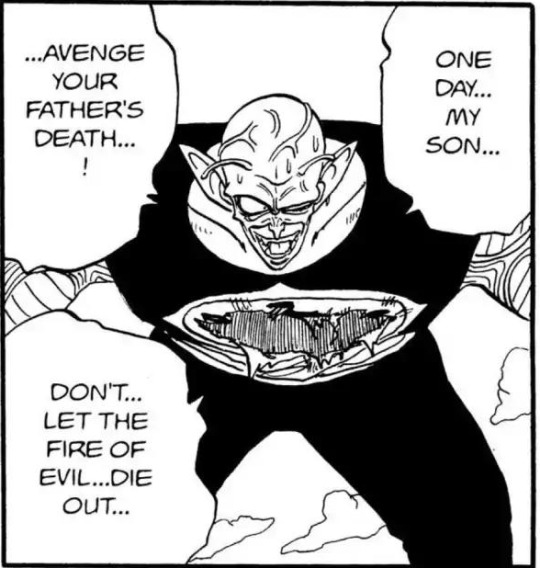
Moments before he spontaneously explodes for... honestly, no clear reason at all... Piccolo speaks to the egg he's reincarnating himself into. It's a weird thing for him to do if the egg contains his own soul or essence or what have you.
But. Well. Contain it, the egg does. Piccolo hatches from his own egg with full continuity of consciousness from his past self. He remembers his identity, he remembers Goku, he remembers God and their relationship, he even remembers the language of his home planet from long before he and God ever divided.

His identity, his personality, every scrap of knowledge he ever knew, is all intact in this new body. Piccolo identifies himself as the Piccolo-Daimao reborn.
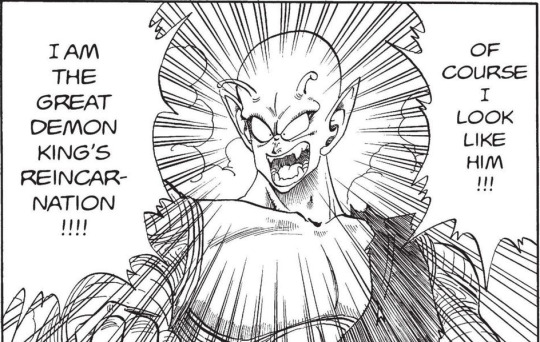
Which God independently corroborates.

Piccolo never died; If he had, God would have died as well. God cannot exist if Piccolo-Daimao does not. This is how the metaphysics work.
An argument could be made that a reincarnation is not entirely the same being. It is nonetheless a new life, a new being. Avatar: The Last Airbender goes to great lengths to show how very different the reincarnations of a single person can be, as each incarnation is born as a blank slate.
But. Uh. Piccolo Jr. wasn't born as a blank slate. He was born with Piccolo's memories, identity, personality, ambitions, etc. fully intact. So trying to label him as a brand new person untethered from the old is ultimately splitting hairs.
However.
What he wasn't reborn as, is a demon. And that's where things get interesting.
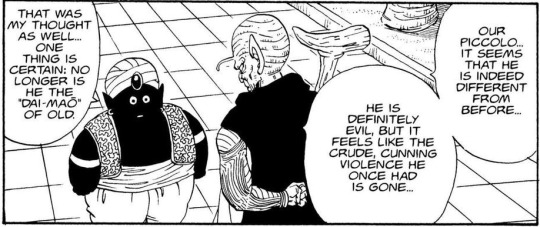
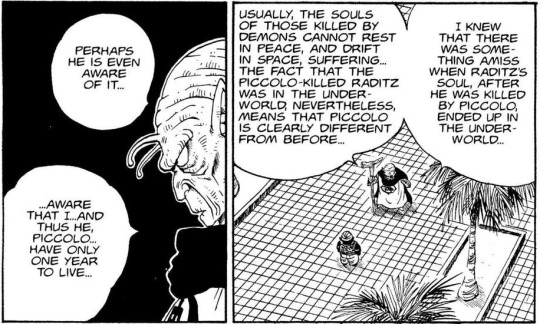
Piccolo reincarnated himself into a new body, but that new body was a new body. In terms of personality and memory and identity, he woke up the same Daimao as before - but metaphysically, he woke up as a fully three-dimensional being, suddenly capable of choice and complexity and moral agency.
He hatched himself into a new Namekian being, rather than a demon spawn.
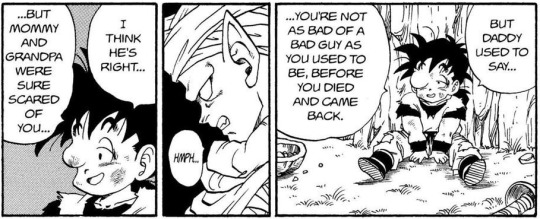
This new form of Piccolo still wanted to take over the world. Because that's what he wanted when he was a demon. Piccolo is a ball in motion from the time he hatches, continuing to pursue the agenda he had in place before his reincarnation gambit.

But. It's. Complicated now, because he can't just do evil for evil's sake. His goals have to make sense now. They have to be a thing that a person would want. Before he even meets Gohan, he's already softened up from Pure Evil Incarnate.
The Demon Lord of old didn't really want to rule the world. It was just a pretense for a slow and cruel genocide. But in this new state, suddenly he cares about his prospective empire. He's concerned now about the wellbeing of the people he would govern.
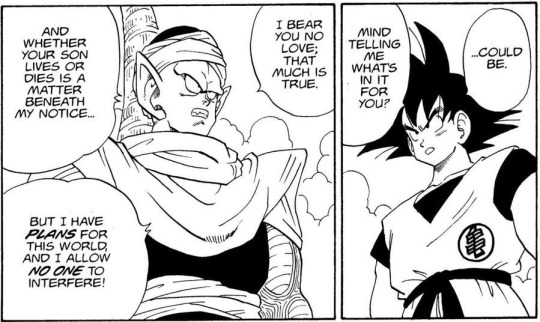
Eight years ago his "plans for this world" were for everyone to die. But here he is like "How dare this asshole try to kill my planet when I intend to rule it!?" He's getting confused about his own motivation because his original motivation was just "Do Evil".
In this form, Piccolo is self-aware now. And he's not happy about his place in the universe.
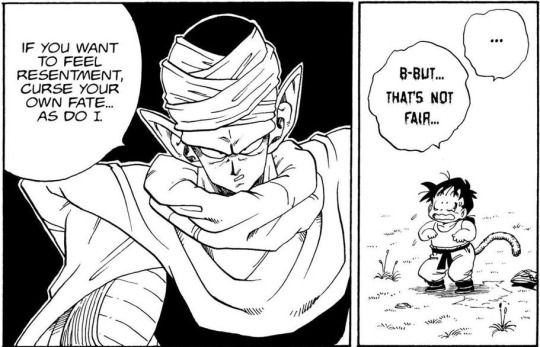
Before, he was acting on just... raw evilness. But now he's emotional. He's bitter. Cynical. Resentful of God. He can feel things now. And with the arrival of the Saiyans bearing down on him, Piccolo's thoughts have turned to his legacy.

People fixate on The Moment but it's the capstone of a point that had been hammered in and hammered in: That Piccolo is changing, that he's been changing since the moment he hatched from that egg. That he is even capable of change because he ceased to be a demon on that fateful day years ago.
It's on the shoulders of all of this groundwork that the fateful moment everyone remembers takes place.
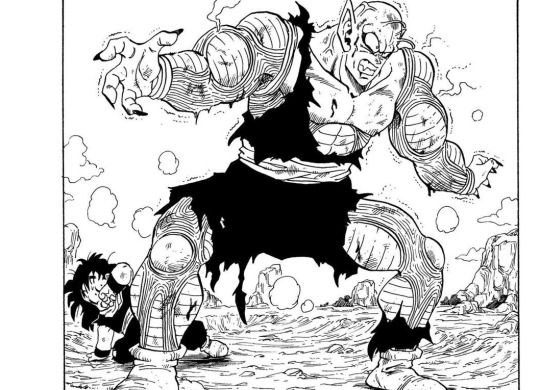

From this point forward, Piccolo is unquestionably 100% a protagonist, though he's still a bit of an asshole.
The debatable transformation in his character comes from his assimilation of Nail.

While Piccolo and Nail's merger does have some fairly explicit effects on his character....
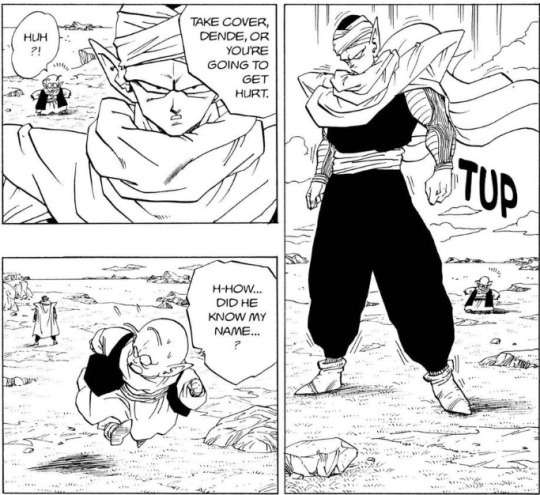
It's not super clear whether his developing sense of empathy for others is a result of it, or a consequence of the growth he's already undergone up to this point.
In either case, Piccolo's development ultimately brings him to his final transformation:
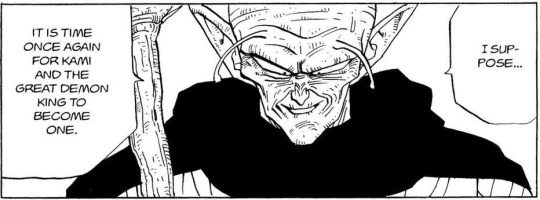
This last transformation is... unusual. In a sense, it devalues the redemptive journey Piccolo's been on up to this point. Despite Piccolo repeatedly insisting "I'M DRIVING, You're just going to be FOOD FOR ME," the new being that results from their joining is at once both Piccolo and God, and neither all the same.
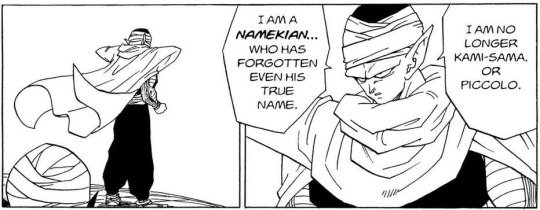
He still answers to the name Piccolo for convenience's sake.

But he's different now. He's humble. Wise. A spiritual leader who offers reverence to the divine and guidance to the uncertain.
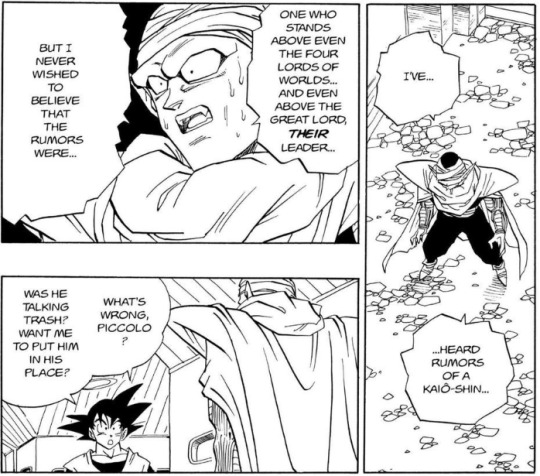

This is not the same man who gleefully spat in the face of God.
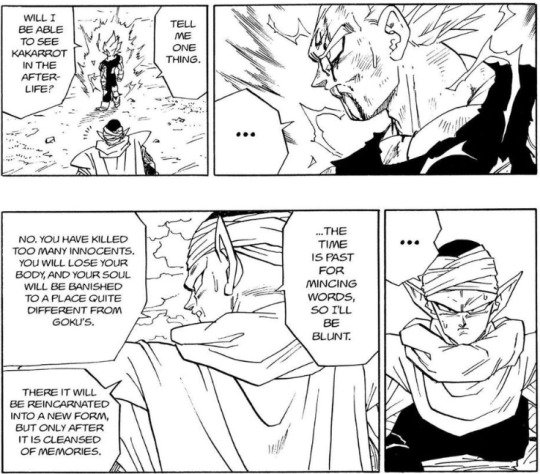
Look at him there, offering spiritual clarity. Piccolo would never.
This new version of Piccolo is effectively a brand new character, bearing some traits from both Piccolo and God. This is not a product of character development, but because they waved a magic wand and fused into a single guy. So it feels kinda cheap.
But at the same time, it's not. Because Piccolo's growth and development wasn't wasted. Indeed, it's that growth and development that brought him to this point; That made it possible for Piccolo and God to rejoin one another in the first place.
This final transformation is Piccolo's redemption; The culmination of a long journey that he's been on, from Pure Evil Incarnate to a three-dimensional man standing at the altar of God in his Temple in Heaven, seeking the ability to protect the people he loves.
The prodigal son finding his way home, to become himself again.
68 notes
·
View notes
Text
Theodor Adorno, Minima Moralia, 61. Court of Appeal:
Nietzsche in The Antichrist voiced the strongest argument not merely against theology but against metaphysics, that hope is mistaken for truth; that the impossibility of living happily, or even living at all, without the thought of an absolute, does not vouch for the legitimacy of that thought. He refutes the Christian 'proof by efficacy,' that faith is true because it brings felicity. For "could happiness - or more technically speaking, pleasure - ever be a proof of truth? So far from this, it almost proves the converse, at any rate it gives the strongest grounds for suspecting 'truth' whenever feelings of pleasure have had a say in the matter. The proof of pleasure is proof of: pleasure - nothing more; why in the world should true judgments cause more enjoyment than false ones and, in accordance with a preordained harmony, necessarily bring pleasant feelings in their train?" (Nietzsche, The Anti-Christ). But Nietzsche himself taught amor fati: thou shalt love thy fate. This, he says in the Epilogue to the Twilight of the Idols, was his innermost nature. We might well ask whether we have more reason to love what happens to us, to affirm what is because it is, than to believe true what we hope. Is it not the same false inference that leads from the existence of stubborn facts to their erection as the highest value, as he criticizes in the leap from hope to truth? If he consigns "happiness through an idée fixe" to the lunatic asylum, the origin of amor fati might be sought in a prison. Love of stone walls and barred windows is the last resort of someone who sees and has nothing else to love. Both are cases of the same ignominious adaptation which, in order to endure the world's horror, attributes reality to wishes and meaning to senseless compulsion. No less than in the credo quia absurdum, resignation bows down in the amor fati, the glorification of the absurdest of all things, before the powers that be. In the end hope, wrested from reality by negating it, is the only form in which truth appears. Without hope, the idea of truth would be scarcely even thinkable, and it is the cardinal untruth, having recognized existence to be bad, to present it as truth simply because it has been recognized. Here, rather than in the opposite, lies the crime of theology that Nietzsche arraigned without ever reaching the final court. In one of the most powerful passages of his critique he charges Christianity with mythology: "The guilt sacrifice, in its most repulsive and most barbaric form: the sacrifice of the innocent for the sins of the guilty! What appalling paganism!" Nothing other, however, is love of fate, the absolute sanctioning of an infinity of such sacrifice. Myth debars Nietzsche's critique of myth from truth.
28 notes
·
View notes
Text
Transcription:
Broadcasting live from the caves of Sinder Karst. That's right, we'll tell you where we live ‘cause you can't reach us; not in a way that matters. It's your boy, Baldwin Home AKA Black Screen, Concrete Front, you already know what it is. Hitting you with another missive from the frontlines, giving you an update on their missiles and known crimes, so you can move under their noses and know where they sharpen their knives, so you can recognize it by sound
([BEEP]: Bank to Church. I'm at position Alpha. [BEEP])
and get your own honed too, cause they need to be! What did I say? Play it back, play it back! (Recorded) They're-they're-they’re moving on us now.
Bilateral Intercession, yet they got three heads. So I gotta break it down for you. It's like this: Stel Kesh. They’ll try to confuse you with half-true museums and the shine of gold and silver. So let's keep it simple. They wear a lot of fancy shirts. I'm not kidding, you should see they closets. And that'd be fine by me, you should see mine! But I know who made my shit. And I know they didn't make it at gunpoint, direct or indirect. Kesh, Kesh only know what's on the label, with Kesh it's always about labels. For as long as there's been a Kesh
([BEEP]: He has no idea. Listen to him go. [BEEP])
they’ve been breakin’ everybody and everything down so it fits into little drawers, little boxes, they’ve been the same since before any of us were living here on Palisade.
Next up, Stel Nideo. They run churches and the schools and the cameras and the swords and the blood coloured jewels. What can I even say that they haven't said themselves? Their little prophet and their big divines treat words like prison cells. It's a prison faith. It's a prison ideology. They locked up they own selves with a warden psychology. They preach fields into gardens, but turn land into landmines. They practice metaphysical
([BEEP]: You gotta give it to Connadine. They all speak on rhythm. [BEEP])
arson, and replace homes with confines.
Which leaves us with just one more head on the Hydra, one more round in the chamber. One more villain inside the intercession, war procession. Exanceaster March, you're worth half a bar, lightweight. But fuck it, I'll give you eight.
You're the
([BEEP]: Roger. Executing now. [BEEP])
ideal mosquito, bloodsucker supreme, turned your back on your people so you could follow your dream of monopolizing the future 'cause fuck it, you want more. Well, so do I, which is why I rhyme and why we'll knock down your--
[Gunshot]
([BEEP] Kill confirmed. [BEEP])
#palisade#friends at the table#palisade spoilers#BIG spoilers imo#f@tt#lmk if the transcript should be otherwise formatted the interjections gave me trouble and i didnt want to write cross bc#i felt it was already communicated but if it needs clarity i will clarify
145 notes
·
View notes
Note
Have you read juliette? It's 10 times as fucked compared to 120 days imo and Sade was adamant about some parts being real.
"This is by far the most realistic of de Sade's books. Research has shown that one after another of the institutions and persons that De Sade denounced were not figures of a diseased imagination but historical truth"
I’m not interested in something being “fucked” Moreso I’m interested in things that do happen in society with enough recurrence that it isn’t odd yet holds a metaphysical emotional weight that disallows it’s discussion amongst other easily synthesised quote unquote “transgressive” concepts into a wider culture. So to look at and to understand paraphilia and the like. It means you can analyse without a knee jerk emotional response. Look at the 70’s rape revenge flicks. That kind of dirt under fingernails grime hasn’t dug itself into our collective consciousness the way say a slasher villain is and you could argue the case of the imagery of the costumed villain that symbolism is more powerful to a populous that simply just wants to get on with THEIR life instead of engaging with other writhing consciousness and action. Of course at the end of the day I do hold a more physical artist approach so it does need a hook for me rather than some faux bisexual woman talking true crime. A hook that has considered aesthetic and tact of course
9 notes
·
View notes
Text
「🪷What you probably
didn’t know about KARMA
By Amaryllis
How Karma actually works…


Now.. here’s what we don’t really see on the internet, unless we really look past mainstream media.
Even for those of us who do look into spirituality, it’s sometimes hard to look beyond the surface.. because a lot of the time we don’t know what is beyond the surface, and we don’t actually know what kind of information to research.
As I do A LOT of research, and have done over the course of many years in relation to topics like the occult, spirituality and metaphysics; I have been lucky enough to stumble across teachers that have shared this secret knowledge with me,personally or through material I have read, as well as my own personal insights and downloads, and I’m happy to share that with you.
NOW… What we are really here for.
Karmic Law
There are two things to take into consideration when thinking about karmic law. One of those things is consent.
Which I would like to explore in this particular post, I will speak on the other aspect of karma in the future.
Let us digest this first.
Now many of us wonder why some people who do really bad things, just seem to get away with it.
The truth is... there is something called the law of consent, which is rarely spoken about, but once you learn about it, it's pretty life changing.
1. Energetic consent is simply given by tuning into something. The simple act of attention, and then choosing to keep your attention on something, it creates an energetic pathway between you and that which you are focusing on.
It is no secret and many of us are aware of the fact that where your energy goes, it flows, and that’s especially true with MEDIA & ENTERTAINMENT.
Now here’s something to dwell upon, have you ever thought about who produces certain means of entertainment, like movies and shows, music,,
and why they’re so often laced with suffering, and dark concepts, which many of us have accustomed our subconscious minds to find as relatable.
Well, nevertheless, I am here to tell you that there is a high possibility for you to manifest that which you focus on because you place so much attention on it and that’s true with media as well.
When you watch things such as scary movies, movies which perpetuate the concept of abuse, movies with very dark themes and concepts .
Have you ever thought that it’s someone’s morbid way of telling you what they have done to others?
Satanists are very aware of the law of consent; and thus have used it to their advantage for many, many years .
Often times in our media and entertainment, the dark themes that we see and come across , are not just works of fiction, but it is someone telling their truth.
And here’s how this ties to karma, when something is shown to you, and you choose to accept it (by tuning into it, not rejecting it) , then it is no longer against your will, therefore it is no longer karmic .
It is instead something you choose to accept , because you, with your own will, decided for whatever reason, consciously or unconsciously; to accept and tune in to what is being shown to you.
And of course it has been extremely advantageous to satanists that people have been kept in the dark about this knowledge, because now they show you the horrific acts and crimes they commit in “works of art” and people believe it is simply an expression and nothing more, and continue to let it happen.
But I am noticing more and more people are starting to wake up; as our media becomes more and more laced with grotesque concepts and themes of sexual abuse.
Pay attention. The truth has been in front of you all this time.
Some may say,” even if it is, I can’t do anything about it”
Yes you can, your attention is where your energy flows. Instead of spending your precious time on negative media outlets, spend that time working on yourself, your own creative energy, focus on things which build you up as an individual.
I want to be realistic, a lot is built on the backbone of horrific acts, but what we can do is at least minimise how much we interact with those things which take away energy from us and which make us feel depleted and dead inside.
And maybe someday, when you have built an empire for yourself you can then focus on the world and help those in need.
Your attention is so powerful; and if we each collectively chose to tune out of these negative frequencies, the less we manifest it, because there are less people giving away their consents to this.
_If you have to study something with a darker concept to be aware of it, set your intention to keep your emotions detached and set your intention that you are only interacting with this portal for research purposes only. Dwelling is what keeps the consent going. But always set intentions, clear your space_

I believe even your regular Narcissists practise this law of consent very well even though they may not be aware of it. Narcissists will often tell their victims who they are , and what they do.
Unfortunately, victims are usually stripped of their right to consent from early on, and therefore struggle with boundaries.
So they have no clue they are giving themselves away unknowingly, because there is no concept of a self, and of the fact that boundaries are something they can apply, it is all normal and comfortable behaviour to them sadly.
AMBIGUITY: By disguising truths in art, it is very easy to mix in the truth with some sort of lie and that’s where people get caught up and they can no longer discern the truth. The half truth and half lie.
You can choose to further your research on satanists and how they apply this, there are a handful of people who have spoken about this and other details in the process.
I am here to make you aware of its existence and how it is tied into consent, so you can at least take your power back.
Your consents, can be taken back. It is not set in stone. Heavier forms of consent would be contracts and that’s where things can get a little difficult.
But there are consents which are easy to take back, I have shared some examples in my post of “How to remove evil eye” & will share more in the future.
Karma means ACTION, and energetic chords, pathways, consents , create further energetic ACTION to be perpetuated.
Wether physically, mentally, emotionally. It is still action and therefore KARMA.
So we can at least work on one level, because working on any level wether it is
- Mentally
-Emotionally
-Physically
It will create a ripple effect in your reality , since everything is spiritual energy in different states of matter.
Taking your energy back is something I hear a lot in spiritual circles, what that actually means is, taking your energy back SO THAT karma is no longer happening, being perpetuated, from wherever you have taken your energy back. You have ended a cycle by doing that.
So yeah energy instigates realities to be created.
Be careful who, and what you give your time and energy into.
Your Will-power, Imagination, Intuition, these all matter so much more than you think, because they create MATTER.
⚡️⚡️⚡️⚡️
HOW CONSENT IS GIVEN AWAY:
- CONSENT & WILLPOWER are intertwined.
Good example: Marriage contract. “I Will”
——
- handshakes
contract formed when you introduce yourself.
mentally tell yourself that you revoke and denounce any contracts given away by you consciously or unconsciously and send away into aether now and immediately.
- attention
the more energy you put into something the more it accumulates, attention is how thoughts, ideas, concepts and beliefs enter your mind
Therefore you have consented to someone else’s will when you accept foreign ideas, so be careful who you listen to.
focusing on yourself builds up your own energy.
- SEX
Unconscious sex can lead to taking on someone else’s emotions, especially as a woman, your womb stores emotional trauma passed down from generations and when you have sex with someone, they often unconsciously trauma dump in your womb.
Many times this leads to women feeling physical discomfort and pain, their body will communicate that they have taken on someone else’s pain.
- Social media
Following and unfollowing is a way to create and break contracts, it creates a pathway between you and another person.
The internet is energy too.
- ——
Not creating intentions for yourself allows someone else to do it for you.
Use your conscious mind to create intentions for your subconscious, not the other way around.
Hey guys! Please keep in mind a lot of time and energy goes into this research :) I love being able to share it with everyone and I want to keep sharing my knowledge unconditionally which is why I haven’t created a Tumblr+.
If you resonated with this & found this helpful, consider to support me from the kindness of your heart so I can keep doing what I love and also provide you with life changing knowledge, you can leave a Tip , by clicking the Tip button in my bio or you can cashapp me £astroroyale
Thank you and much love to you all.
Don’t let yourself take on someone else’s pain (karma)
Protect yourself.
Liz briefly speaks on consents in this video she has and it literally took me by surprise, but as she mentioned she paid a lot of money to get this information. I have elaborated on that concept in this post.

youtube
#feminine energy#healing#law of attraction#manifesting#self healing#metaphysical#metaphysics#metaphysician#energy work#masculine energy#dark feminine energy#energetic#self help#holistic approach#holistic healing#manifestation tips#manfiestation#occulltism#occult#esoteric#esoteria#manifestation techniques#law of manifestation#law of the universe#law of vibration#law of assumption#law of abundance#law of success#law of affirmation#karma
88 notes
·
View notes
Text
A Piece of True Fiction: Chapter 13
An Alan Wake 2 fic. Spoilers for Alan Wake 2!
Summary: Aleksi Kesä manages to slip out of the spiral and film he was trapped in.
Saga Anderson, caught in the middle of Wake's horror story, finds a man that looks identical to her partner in the middle of the woods. He's lost, confused, and only seems to speak Finnish. Saga has to try and uncover the truth as well as trying to save her family. Where did he come from? How did he get here?
And where's her Casey?
Chapter Summary: Saga asks Ilmo for help. Words: 2,457 AO3 Link: [Here!] [First part] [Previous part] [Next part]
A Piece of True Fiction
Chapter 13: Brotherhood
“So let me get this straight. Alex Casey, who is real and was partnered on the case with you, is trapped in the lake right now.”
“Yup.”
“And this is because the man in there, the one you busted your ass to save, is a metaphysical conjuration from the Threshold under the lake and took his place.”
“Mhmm.”
“And you’re in possession of a potential Object of Power- which is a whole other conversation we need to have, by the way- that Wake says he’s bound to and can use to ‘fix’ what you claim to be a false rewritten reality, originally written by Wake himself but edited by his, quote, ‘evil doppelgänger’?”
Saga cringes. Having the facts laid out straight in her head made everything seem straightforward, but hearing it spoken back to her starts to make her feel as crazy as she sounds. Still not as crazy as Wake, at the very least.
“If you mean the Clicker, then yeah, that's right. And I’m just passing on what Wake said,” she answers.
Estevez continues to hear her out, though not without a heavy slice of doubt.
“But you won't give it to him now because… why?”
Now that’s a question with a simple answer.
“Because I don't think losing Casey is something he wrote into his story. Maybe he can fix his own mistakes- he’d better- but I don't know how he’d be able to fix something he doesn't know anything about. Or maybe he could, but I can't risk Casey’s life like that.”
“So you want to perform a ritual on… ‘Kesä’, did you say?”
“That's right.”
“Okay, yet another paranatural crime right there but… fine, I digress. So this ritual, the one the Cult of the Tree has been performing, is one where you want to take out his heart to purposely infect him with the Shadow and somehow exchange him for Casey?”
“It’s something like that, but that's why I need to talk to Ilmo to figure out the specifics.”
Estevez shakes her head. “Okay, I can't brush that one off. Rituals are dangerous as is, but in an uncontrolled environment? This ritual is murder, Anderson.”
“He’s not real,” Saga counters, not dwelling on the way Estevez speaks of the concept of rituals with what sounds like experience.
“According to who?”
“Alan Wake.”
Estevez frowns. She takes a breath and looks Saga directly in the eye.
“I know how it all sounds,” Saga says with a wince before Estevez gets the chance to say anything. “I just don’t know what else I can do. I followed Wake’s directions with Nightingale's heart and that ritual worked, so I just need to trust that it’ll work again a second time.”
“I don’t like this, Anderson. Not one bit.”
“Neither do I,” Saga admits. “But I have to try.”
There are a few tense moments of Estevez simply staring at her. Her eyes scan over her face as if looking for something in particular. Saga shows no pretense. She doesn’t like this, but she’s determined and she’s going to try whether she gets permission or not.
Estevez seems to realize that and releases a resigned sigh. “Alright. Go talk to Koskela. You have me as backup as long as you deny my involvement, if it comes to it.”
“Thank you,” Saga says, and she means it from the bottom of her heart. She can tell that Agent Estevez must be going against her bureau’s rules by helping her, so she’s grateful for the sentiment.
Estevez shakes her head. “Just go. And be careful.”
Saga doesn’t need to be told twice. She leaves Estevez with one last grateful nod before the smile slips away from her face. It’s immediately back to business. She’s given up all hope for any sort of break until this is all over.
Or until she dies. But as long as Logan’s life is in danger, dying isn’t an option.
She enters the cell block.
Inside, the air is stale and carries the faint stench of vomit. It’s as dark as ever, though upon entering her eyes are able to make out the figure hunched-over on the bench of one of the nearer cells.
Saga approaches warily.
“I’m sorry,” a voice says from further down. Wake. “I tried eating but it’s been so long and… I-I couldn’t… I’m sorry. I’ll clean it up.”
She doesn’t have eyes on Wake, meaning he most likely doesn’t have eyes on her yet. She can hear him shuffling around, probably trying to get a look at who just walked in. This time, however, Saga isn’t interested in Wake.
Ilmo slowly lifts his head from where it had been resting on his knees to look up at her and Saga notices that he’s abandoned his hat. His eyes are red and swollen and his deep frown exudes a silent fury.
“Where is he?” he asks in a low voice.
He knows. Saga can tell that he knows about Jaakko. She doesn’t know how he knows, whether it be through supernatural means or simply the instincts of an identical twin, but he knows.
She won’t hide it from him.
“I’m sorry,” is all she says.
“Saga?” Wake calls suddenly, his voice immediately perking up. “Is that you? Did you find the Clicker?”
Saga just observes Ilmo like a hawk, as if he’s the only other person in the room. The man is eerily silent.
Then he slams the metal cot with his fist with a loud clang and swears loudly, before a sob bursts out of him and he begins to mutter mournfully to himself in Finnish.
“I’m sorry,” Saga says again. Her twisted heart constricts even more because she’d been there at the time, and the guilt of not being able to save Jaakko returns full-swing as she watches his brother react to the news. In any FBI case, not just this one, informing the family of any deceased is the hardest part. Especially as a mother herself.
Ilmo wipes a hand over his face, leaving a slight sheen on his skin. He stands and walks over toward the bars. Saga has to once again fight the urge to take a step back. It’s surprising how much a hat (or, lack of) can change a person’s energy.
His fingers curl around the metal bars and he presses his face against them.
“How?” he grits out.
“He fell into Huotari Well,” Saga answers honestly. Her skin prickles from the tension in the limited space between the two of them. He's still acting in an aggressive way that seems strange to her, but she lets it slide knowing that grief can change a person. Ilmo curses again. He takes a few steps away from the bars and Saga releases the breath she’d been holding.
Alan calls out to her again. She continues to ignore him.
“I am truly, truly sorry, Ilmo. I can’t imagine how you’re feeling.”
His eyes snap up to meet hers alongside a curt response. “No, you can’t.”
She’s sure he didn’t mean it, but the comment pierces into her heart and cracks it open like an eggshell, revealing her suppressed emotion hidden inside. She does understand. Her daughter, her only child, is dead because of this stupid fucking story. She knows the feeling and, though she’d said she didn’t at first to be polite, anyone insinuating that she doesn’t makes her very, very angry.
Straight away, she quenches the feeling. She has to keep a clear head. She forces herself to speak levelly.
“I promise I’ll give you time to mourn later, but right now I really need your help. I need to perform a ritual.”
That seems to catch Ilmo’s attention. “What?”
“Saga?” Alan calls inquisitively. Saga can see him peering through the bars.
Ilmo also glances in his direction and sends him a scowl (was that a growl? What’s going on with him?) before turning back to Saga, suspicious. “Why? What sort of ritual, what are you doing?”
“The ritual with the heart that the cult have been doing. I need to give someone to the Dark Presence and have them be Taken to get someone back in return.”
Ilmo, tear-stricken face and all, looks at her with utter incredulousness.
“Okay, now I’m confused. You said like a whole three different things there.”
It’s Saga’s turn to feel confused. “What do you mean?”
“The ritual we’ve been doing involves a heart, sure,” Ilmo explains, “but why do you want to make Taken? The heart ritual is to kill them using the switch- or the Clicker, I guess. The second they emerge from the lake, we kill them. We protect the community. We're the good guys. What kind of a cult calls themselves a cult?”
That… makes a lot of pieces fall into place. Things hadn’t been lining up in Saga’s Mind Place, although reframing all the evidence with the idea that the Cult of the Tree were killing Taken helps it make much more sense.
“And if you’re trying to trade in one person for another, then uh… that’s a whole other thing.”
“That’s the one I need.” Saga says with no hesitation.
Ilmo visibly pales, even under the darkness of the cell block. “Uh… are you sure?”
“Does it involve dropping a heart into a well?”
“Well… yeah, but-”
“Then I’m sure.”
“What the fuck are you talking about?!” Alan shouts, his timid confusion finally erupting into explosive anger.
Saga approaches his cell. This time, Ilmo calls after her. “Wait, Saga-"
“I’m getting Casey back,” she tells Wake plainly. “After that, I’ll do as you say so you can bring back my daughter. And Ilmo’s brother.”
“You’re wasting time,” Alan hisses. “I can fix everything if you just give me the Clicker. It’ll let me rewrite reality to whatever you want, it’ll solve everything, just find it and get it to me. And what was that about a ritual?”
“You don’t remember telling me?”
All of Wake’s built up anger seems to evaporate in an instant. “I… huh?”
“I can’t help you.” Ilmo says suddenly, pulling Saga’s attention back toward him.
“You have to,” she says, hurrying back in his direction.
He shakes his head. “No, I can’t. It’s not because I don’t want to help you, I just can’t.”
“Why not?” Saga struggles to mask the frustration in her voice. This isn’t a hurdle she’d been expecting to face.
Ilmo sighs and scratches at his chin. “Okay, this might sound crazy, but Jaakko and I have dreams. Dreams where we’re, uh…”
“Not yourselves?” Saga finishes. “Jaakko explained it to me.”
She watches as Ilmo’s eyes well up with tears and he swallows down his emotion. When he next speaks, his voice is thick.
“We’ve been fighting,” he says. “I’ve been fighting to not be that man. And that ritual, the one with the heart and the well, I’ve seen it in my dreams. That’s why I can’t help you, Saga. I’m already… I didn’t mean to punch that guy, you tell him that. I just don't want it taking hold of me. I can’t be that man. ”
Saga can see where he’s coming from. She really wants to be able to leave him alone and mourn, but she needs his help. Does she feel guilty and slightly selfish? Yes, she does. At the end of the day, Casey is one man compared to the many that Wake could save if she just gave him the Clicker now.
Except that one man is Casey. It’s the textbook trolley problem and she’s trying to save everyone on those tracks. The odds aren’t in her favor, but she’s going to try. If that means Ilmo has to leave his comfort zone and Estevez has to break a few rules, so be it.
“You won’t be. You aren’t. You won’t have to do it all yourself, I’ll help you where I can. What are the steps?”
She doesn't voice her inner thought that Ilmo is already acting in a more aggressive manner.
Ilmo shifts uncomfortably. “I mean… I guess you’re right. The one in the dream is pretty unique, anyways. It needed a specific guy- the, um… right, the steps. Pretty straightforward. Cut out the heart while he’s- uh, they’re still alive, recite the chant, drop the heart into the well. Sacrifice vanishes and the rescued rises up.” He pauses. “Saga, are you planning on killing someone?”
“Someone that’s already becoming Taken.” It’s a lie, but it’s easier than explaining everything that’s going on with Kesä in one succinct sentence. Plus, if she phrases it like this, it might make Ilmo more inclined to help her.
“Right…” He still sounds hesitant.
Saga quickly changes the subject. “What’s the chant?”
“In the dream, it’s Finnish. In English it would be something like, um… ‘This is the ritual to lead you on. He returns and you’re locked in the room in turn.’”
All of Saga’s own hesitation about the ritual vanishes at that moment, replaced with relief and a bolster of determination. That’s exactly what she needs and is exactly what the other Wake described. Casey back and Kesä locked back in the Dark Place. She’s on the right track.
“I don’t want to do this, Saga.” Ilmo breaks through her thoughts.
“You’re performing a ritual?” Wake cuts in. “I swear there was something like that… I just can’t fucking remember…”
Saga leaves him to his rambling and tries her best to convey reassurance to the tense Ilmo. “I’ll be in your debt if you help me with this, Ilmo. Then we’ll talk things through and I’ll hear you out about what you and the cult were trying to do.”
“What?!” Alan yelps.
It seems to be against his own better judgment, but eventually Ilmo nods. “Fine, I’ll help. As long as you promise to stop me if I start acting like someone else. I have to be Ilmo Koskela.”
Despite everything, Saga gives him a small smile. “I promise. Thanks, Ilmo Koskela. I’ll have Agent Estevez talk to you about the specifics. I just need to make a quick stop at the nursing home, then we’ll make our way to Coffee World.”
She still fully intends to visit Tor and Odin. It had been her plan originally and Ahti mentioning it gave her the push she needed to actually complete that task.
Ilmo somehow looks even more uneasy at the prospect. “Coffee World? Huotari Well? Fuck, out of all places… You’d better make good on that promise.”
“I will. I’ll see you soon, Ilmo.”
Wake yells after her as she starts to leave. “Saga, wait! This isn’t right!”
Saga leaves. Until she’s ready to hand over the Clicker, she has nothing more to say to him.
aka the one where alan is kept out of the loop (literally? hmmm)
Thanks for reading!
#alan wake 2#alan wake 2 spoilers#fanfic#saga anderson#kiran estevez#ilmo koskela#alan wake#alex casey#aleksi kesä#ilmari huotari#yötön yö#a piece of true fiction
9 notes
·
View notes
Text
Sick of it all. Sickness. Collection of notes.
Sickness is a language
Body is a representation
Medicine is a political practice
— Bryan S. Turner, The body and the society
"What I lack is words that correspond to each minute of my state of mind."
— Antonin Artaud, The nerve meter
"Desmesurado enfermo Bárbaro limpio de rutinas y caminos marcados No acepto vuestras sillas de seguridades cómodas Soy el ángel salvaje que cayó una mañana En vuestras plantaciones de preceptos Poeta Anti poeta"
—Vicente Huidobro, Altazor.
"I saw the best minds of my generation destroyed by madness, starving hysterical naked" —Allen Ginsberg, Howl.
"First, we believe that the world must be changed. We desire the most liberatory possible change of the society and the life in which we find ourselves confined. We know that such change is possible by means of pertinent actions". —Report on the Construction of Situations
"In his 1954 book Mental Illness and Personality Foucault combines the subjective experience of the mentally ill person with a sociocultural historical approach to mental illness and suggests that there exists a reciprocal connection between individual perception and sociocultural development. (…) what I call a historical phenomenology that combines the subjective experience of the mentally ill person with a sociocultural historical approach to mental ill-ness." —Line Joranger, Individual perception and cultural development: Foucault's 1954 approach to mental illness and its history
"The former, a lovely maiden in the broad daylight, rocked its cradle, endowed it with a charm and glory of its own. Presently it fell sick, lost itself in the darkness of the Middle Ages, and was hidden away by the Witch in woods and wilds: there, sustained by her compassionate daring, it was made to live anew. (…) Are we quite sure of what has been so often repeated, that the gods of old had come to an end, themselves wearied and sickened of living; that they were so disheartened as almost to send in their resignation; that Christianity had only to blow upon these empty shades? (...) By a vow my mother made in her sickness my youth and my life are bound for ever." —Jules Michelet, La Sorcière.
"At the point of departure, then, one may place the political project of rooting out illegalities, generalizing the punitive function and delimiting, in order to control it, the power to punish. From this there emerge two lines of obiectification of crime and of the criminal. On the one hand, the criminal designated as the enemy of all, whom it is in the interest of all to track down, falls outside the pact, disqualifies himself as a citizen and emerges, bearing within him as it were, a wild fragment of nature; he appears as a villain, a monster, a madman, perhaps, a sick and, before long, 'abnormal' individual. It is as such that, one day, he will belong to a scientific objectification and to the 'treatment' that is correlative to it." —Michel Focault, Discipline and Punish
Nastasya was overcome with a fit of laughter. She was given to laughter and when anything amused her, she laughed inaudibly, quivering and shaking all over till she felt ill. "And have you made much money by your thinking?" she managed to articulate at last. "One can't go out to give lessons without boots. And I'm sick of it." "Don't quarrel with your bread and butter." "They pay so little for lessons. What's the use of a few coppers?" he answered, reluctantly, as though replying to his own thought. —Fyodor Dostoevsky, Crime and Punishment.
"What I’d felt there was true, no doubt about that. The experience had revealed to me, in a brutal way, the unreality of this world, the realized abstraction which is the Spectacle. The whole metaphysical – and thus total and filled out all the way to the existential sphere– dimension of this concept had appeared clearly to me in this private mode of disclosure, and could appear as it really is, as something really strange, posing a problem the essence of which is absolute foreignness, only insofar as it is lived as an experience, as a phenomenon. Habit makes phenomena be forgotten as phenomena, that is, the supra-sensible – must I add that Hegel’s famous affirmation too took on a kind of dazzling conreteness, the power of a revelation? And yet, habit is precisely the characteristic means of commodity metaphysics, its manifestation, which never manifests anything but the forgetting of its character as a manifestation… That’s how the bulging intuition of Absence also reveals that it’s already transcended as such, since it presents itself as a manifestation of the forgetting of the manifestation as such, meaning as the revealing of the commodity mode of disclosure, as the revealing of the Spectacle." —Tiqqun, Phenomenology of Everyday Life
"17.- Sense is the element of the Common, that is, every event, as an irruption of sense, institutes a common. The body that says "I," in truth says «we." A gesture or statement endowed with sense carves a determined community out of a mass of bodies, a community that must itself be taken on in order to take on this gesture or statement.
50.- Empire exists "positively" only in crisis, only as negation and reaction. If we too belong to Empire, it is only because i is impossible to get outside it .
52.-At first glance, Empire seems to be a parodic recollection of the entire, frozen history of a "civilization." And this impression has a certain intuitive correctness. Empire is in fact civilization's last stop before it reaches the end of its line, the final agony in which it sees its life pass before its eyes." —Tiqqun, Introduction to Civil War
"For Americans are finding more and more that they lack muscle and children, that is, not workers but soldiers, and they want at all costs and by every possible means to make and manufacture soldiers with a view to all the planetary wars which might later take place, and which would be intended to demonstrate by the over-whelming virtues of force the superiority of American products, and the fruits of American sweat in all fields of activity and of the superiority of the possible dynamism of force. Because one must produce, one must by all possible means of activity replace nature wherever it can be replaced, one must find a major field of action for human inertia, the worker must have something to keep him busy, new fields of activity must be created, in which we shall see at last the reign of all the fake manufactured products, of all the vile synthetic substitutes in which beatiful real nature has no part." —Antonin Artaud, To Have Done With the Judgement of god
"A study published in the May 2021 issue of the British Journal of Health Psychology looked at health-related guilt in relation to having chronic pain. (…) The research turned up three major themes that had been reported on in the previous research. These included the following.
-Management of chronic pain -Diagnostic uncertainty or legitimizing pain -How the person impacted others by their action or inaction. -The health-related guilt that many people with chronic pain experience is from coping with the condition and the decrease in quality of life that it often brings about. (…) Those who have chronic pain may feel guilty because they are unable to do things they want to do. They may feel that they are letting others down, or they believe they are doing something wrong or intentional. The guilt can lead to more issues, such as depression, making it something that should be addressed." —Steven H. Richeimer, The Impact of Health-Related Guilt and Chronic Pain
"No soy Pasolini pidiendo explicaciones No soy Ginsberg expulsado de Cuba No soy un marica disfrazado de poeta No necesito disfraz Aquí está mi cara Hablo por mi diferencia Defiendo lo que soy y no soy tan raro Me apesta la injusticia y sospecho de esta cueca democrática Pero no me hable del proletariado Porque ser pobre y maricón es peor Hay que ser ácido para soportarlo (…) ¿Van a dejarnos bordar de pájaros las banderas de la patria libre? El fusil se lo dejo a usted que tiene la sangre fría y no es miedo El miedo se me fue pasando De atajar cuchillos (…) Aunque después me odie Por corromper su moral revolucionaria ¿Tiene miedo que se homosexualice la vida? Y no hablo de meterlo y sacarlo Y sacarlo y meterlo solamente Hablo de ternura compañero." —Pedro Lemebel, Hablo por mi diferencia
"In late 2014, I was sick with a chronic condition that, about every 12 to 18 months, gets bad enough to render me, for about five months each time, unable to walk, drive, do my job, sometimes speak or understand language, take a bath without assistance, and leave the bed. This particular flare coincided with the Black Lives Matter protests, which I would have attended unremittingly, had I been able to. I live one block away from MacArthur Park in Los Angeles, a predominantly Latino neighborhood and one colloquially understood to be the place where many immigrants begin their American lives. The park, then, is not surprisingly one of the most active places of protest in the city.
I listened to the sounds of the marches as they drifted up to my window. Attached to the bed, I rose up my sick woman fist, in solidarity.
I started to think about what modes of protest are afforded to sick people – it seemed to me that many for whom Black Lives Matter is especially in service, might not be able to be present for the marches because they were imprisoned by a job, the threat of being fired from their job if they marched, or literal incarceration, and of course the threat of violence and police brutality – but also because of illness or disability, or because they were caring for someone with an illness or disability.
I thought of all the other invisible bodies, with their fists up, tucked away and out of sight. If we take Hannah Arendt’s definition of the political – which is still one of the most dominant in mainstream discourse – as being any action that is performed in public, we must contend with the implications of what that excludes. If being present in public is what is required to be political, then whole swathes of the population can be deemed a-political – simply because they are not physically able to get their bodies into the street.
(…) The Sick Women are all of the dysfunctional, dangerous and in danger, badly behaved, crazy, incurable, traumatized, disordered, diseased, chronic, uninsurable, wretched, undesirable and altogether dysfunctional bodies belonging to women, people of color, poor, ill, neuroatypical, differently-abled, queer, trans, and genderfluid people, who have been historically pathologized, hospitalized, institutionalized, brutalized, rendered unmanageable, and therefore made culturally illegitimate and politically invisible." — Johanna Hedva, Sick Woman Theory
"I’m all for the death of capitalism, but what the hell was this? Sick, pained, expensive, sensitive: these were not words that inspired any revolutionary fervor in me. My anarchism had always been a thing of life, vitality, and beauty. When I think of it energetically, I feel strong rivers of red force, unbridled kinetic power moving reality. It’s a verb, something you do.
My heroes didn’t go to General Assemblies to talk, they robbed banks and shot fascists. They burned down houses or construction equipment instead of engaging in sit-in’s or camping sessions. My anarchism is unapolegetically violent, even gleefully so, and I long for the acrid smoke of a riot like junkies long for meth.
Here appeared to be the quiet, soothing politics of the ill. Anarchist therapy. I was happy to see those confined to a hospital bed could display solidarity in their own way, but I walked away firmly convinced I’d taken a stroll through a world that had no bearing on mine.
Some people’s revolution involved care and love and feelings. Mine involved bullets and fire and blood.
Yet…something lingered, some subtle shift deep within my mind. I began to realize that just because the response of the ill to capitalism might be different from mine, that did not mean the exploitation they lived under was any less brutal." — Dr. Bones, Too Weird to Live: The Case for the Individual in a Sick Woman’s World
"And, left to themselves, men lived long before they understood that they all ought to, and might be, happy. Only in the very latest times have a few of them begun to understand that work ought not to be a bugbear to some and like galley-slavery for others, but should be a common and happy occupation, uniting all men. They have begun to understand that with death constantly threatening each of us, the only reasonable business of every man is to spend the years, months, hours, and minutes, allotted him—in unity and love. They have begun to understand that sickness, far from dividing men, should, on the contrary, give opportunity for loving union with one another." — Leo Tolstoy, Work, Death and Sickness
#leftism#leftblr#anarchism#anarchist#postmodernism#postmodern#postmodern literature#politics#Antonin Artaud#Leo Tolstoy#Pedro Lemebel#tiqqun#Collection of notes#comunismo#communism#mental illness#chronic pain#chronic fatigue#antiwork#anti landlord#michel foucault#foucault#sickness#chronic illness#chronically ill#poetry#words words words
19 notes
·
View notes
Note
For Aidan
🍓 (strawberry)
🐞 (ladybug)
🎸 (electric guitar)
🪓 (axe)
🍓 (strawberry) - Does your oc believe in anything? Are they superstitious? Religious? Atheistic? Has anything in their past made them this way?
The Path of Death and the Soul is the closest thing he has to a belief system. He's actually got the V5 mindset of it, which is less philosophical and metaphysical than in previous editions. Otherwise he'd like to say that he's a hardcore atheist, except he's very intimately aware that the afterlife and ghosts exist and of the properties of the soul when it comes to kindred physiology involving stakes in the heart and diablerie Noddism ain't his thing and he's happy not calling himself Catholic anymore even if he does still go to church sometimes (he has a soft spot for the choir…). He's having a great time no longer being in a stifling environment that pressures him to feel shame for being himself, or one that forces him to accept a Christian mythos as real and true but with a twist, and really loves having a boyfriend whose whole code of ethics revolves around indulgence and corruption. There's never a dull moment with him
🐞 (ladybug) - What does a perfect day look like for your oc? What do they do? Who do they see?
Aside from the obvious sucking and fucking Jesse all night and being a good obedient free use cocksleeve? Uh. He'd enjoy a cozy operation or two in his morgue, make some art or music with his band, mayhaps clean a crime scene for somebody and take a bunch of photos for his collection, plan or carry out a murder, go to a concert or a graveyard, go on the prowl and stalk people around the city, train at the gym, maybe take a drive or have a stakeout with Jesse that ends up with their hands all over each other... The more activities he can spend with Jesse the better, and even better if Lukas doesn't come calling for some asinine bullshit that he should be able to handle himself as Sheriff ("That's below my paygrade!")
🎸 (electric guitar) - What’s your character’s music taste like? Do they have one or two artists they play on repeat or do they have a varied and eclectic collection of music? Do they like mainstream artists or prefer underground musicians? What genres do they enjoy?
He likes it hard and fast with a lot of screaming blasting out his eardrums. Lets him live vicariously and pretend he's not totally cold inside-- gives him acting material to work with. He likes being cold and doesn't feel like a person at all and the sheer amount of emotion in the songs he listens to serves as an example and helps him fake humanity better As a musician he listens to a lot of different bands, from mainstream to underground. Talent can be found anywhere and he keeps an open mind. His own bands are pretty underground so he sort of relates to those ones more overall. Small venue or basement shows are his jam He gravitates to goregrind/death metal/grindcore the most. That's what he performs himself. Due to Reasons™️he is also involved in the local punk scene and will listen to that genre often as well. Jesse has his own tastes in metal but Aidan has fun listening to those types with him too
🪓 (axe) - Does your oc have survival skills? Have they ever had to use them? What would they do in an apocalypse? Could they survive?
At the very least Aidan knows how to strip and preserve a corpse so you could get him to be semi-useful while hunting for food, and he can turn the parts into something useable. He's also highly attuned to his surroundings at all times and could utilize his forensics experience to analyze any given area and learn about it But he's a city boy to the core. Don't expect him to know anything about camping in the wilderness for 5 days. He could survive in an apocalypse if he had some help lmao Also yeah he has medical expertise and theoretically could provide medical aid to people. HOWEVER he is a Necronomist and it goes against everything he stands for to prevent death (he has to quicken it), so he wouldn't be very popular or have many allies in an apocalypse scenario
2 notes
·
View notes
Note
Knowing that it's one of your favourite films, have you ever written or have any wish to write anything about Ken Russell's Altered States? I watched it last night and was appropriately dazzled by his images and high conceits, but I can't help feeling that, like Dostoevsky, the final embrace of love as a panacea feels forced and inadequate in comparison to the earlier spiritual darkness of the self that begets the high visions.
I haven't written extensively about it, but I did discuss the film, and particularly this aspect of it, with the poet Emmalea Russo at the end of our conversation from last summer.
Obviously Russell's spectacular aesthetic accommodates a tragic conclusion, as when he's working with the more "severe" literary source material provided by Lawrence and Huxley for Women in Love and The Devils, respectively. Chayefsky's script for Altered States could be described ungenerously as promoting the quotidian, even the bourgeois, against the pursuit of metaphysical extremity these earlier films indulge. We could even historicize this development, if we really wanted to be wet blankets, by seeing the 1980 film as a document of the transition between the residua of the radical '60s and the vanguard of the conservative '80s.
(Here I would distinguish Chayefsky from Dostoevsky, whose vision of Christian "active love" seems more extreme than what Chayefsky portrays: for example, if you contrast Sonya's extremes of self-sacrifice in Crime and Punishment, the novel's ethical model, with the more mundane portrait of an apparently resilient marriage in Altered States—and not even a resilient marriage as the spiritual communion of gnostic self-sufficient souls, as with Lawrence's Rupert and Ursula—or perhaps Rupert and Gerald—in the aforementioned Women in Love, but rather an apotheosis of loyalty and affection over this kind of soul-vision.)
And yet for all that I am willing to take Altered States on its own terms: there is nothing really there for us in that inner space or journey back down the brain stem the film's visionary sequences depict. It's not truer than anything else we experience for all that it may be more spectacular, hence the idea Pauline Kael alludes to that there is some conflict in the film between Russell's Catholic baroque and Chayefsky's Jewish iconoclasm. In any case, the film's thesis is that primordial holds no priority, that evil is not more interesting for being only the absence of love. I think the film is a coherent elaboration of this idea, but it's certainly true that Russell's visionary and occult imagery overwhelms the philosophy and is mostly what we remember—unless we join Emmalea Russo in our conversation linked above and romanticize the party sequence where Edward and Emily meet in the first place and allow the (erotic) charisma of the actors to challenge the memorable perversities displayed elsewhere in the film.
As for the overall question of whether or not a happy ending cheats an otherwise dark narrative or dramatic vision of its integrity, I tend to think not. Hegel gives us a test we can apply in his Aesthetics (I quote the Osmaston translation from Hegel on Tragedy):
Much as poets present to us the bare downfall of particular people they are also able to treat the similar contingency of the development of events in such a way, that, though the circumstances in all other respects would appear to give them little enough support, a happy issue of such conditions, and characters is secured, in which they elicit our interest. No doubt the favour of such a destiny of events has at least an equal claim upon us as the disfavour. And so far as the question merely concerns the nature of this difference, I must admit that I prefer a happy conclusion. How could it be otherwise? I can myself discover no better ground for the preference of misfortune, simply on its own account as such, to a happy resolution than that of a certain condition of fine sensibility, which is devoted to pain and suffering, and experiences more interest in their presence than in painless situations such as it meets with every day. If therefore the interests are of such a nature, that it is not really worth the trouble to sacrifice the men or women concerned on their altar, it being possible for them, either to surrender their objects, without making such surrender as is equivalent to a surrender of their individuality, or to mutually come to an agreement in respect thereof, there is no reason why the conclusion should be tragic. The tragic aspect of the conflicts and their resolution ought in principle merely to be enforced in the cases where it is actually necessary in order to satisfy the claim of a superior point of view.
In other words, a tragic resolution is only required if the narrative logic demands the sacrifice of the characters to a worthwhile principle higher than themselves. (Hegel's model is the ideological conflict between legitimate transcendent principles—the family vs. the social order—in Antigone.) Lawrence's extraordinarily ideal vision of marriage, to which neither Gerald nor Gudrun can measure up, might also qualify in Women in Love, and likewise Grandier's fidelity to a kind of robust human wholeness threatened with extinction both by the hysterical nuns and the pious witchfinders in The Devils. But if a character is immolated for a worthless principle, then we are, Hegel suggests, in the presence of a merely morbid authorial sensibility. On this account, Dostoevsky's Christian ideal and Chayefsky's humanist one deserve their triumph over the evils that confront them, however (merely) spectacular. Whether in aesthetics there is any such thing as a "mere" spectacle is another question, of course, and we continue to dream of a work of art that is whole and unriven, its theme and its form one and indivisible—at least as a picture of human happiness.
(You might please keep all of this mind as you read the forthcoming epilogue of my novel Major Arcana...)
5 notes
·
View notes